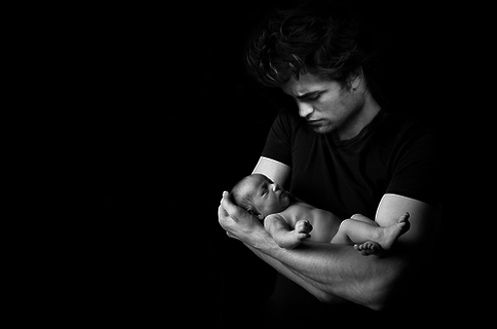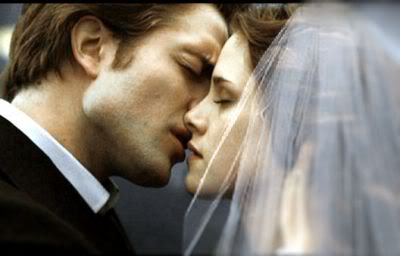This book is unclassifiable in a way - part Romeo and Juliet, part Rosemary's Baby, part tortured love triangle between a vampire, a werewolf and a human soon to become a vampire - yes, I used all three of those nouns in a sentence to describe the plot.
You read it (I read it) because you are captivated by the teenage Bella Swan's dilemma. She is a good girl (a human) enamored of a "bad boy" (a vampire) who is compelled to do evil at times to survive but who is intrinsically good and has, as Meyer tells it, the bearing of a prince, the intelligence of an old soul and is completely enamored of our hapless heroine with whom we identify even in our (ahem) advanced years.
When we last left Bella in the third book, Eclipse, she had finally convinced Edward to change her into a vampire so that she might remain young with him. His stipulation: she must marry him which she was very hesitant to do. Her biggest fear was that, as a human, she would age and that he, as a vampire, would not.
Edward is still annoyingly "perfect" here: golden eyed, marble skinned, blah blah blah. The word perfect is one of the most overused in this novel. These same adjectives have unvaryingly clung to Edward for the whole of the four books.
Characters continue to chuckle, gape, gasp, snarl, snort, mumble, murmur. I wish Meyer had a wider vocabulary for verbs. No, actually, I wish the opposite to be true. I wish she would just simply say "he said" or "she said" instead of these repetitive permutations.
Am I old? Do I no longer value the expression of physical love? The constant petting and touching of the lovers' faces grates. Hey, I remember being in love as a teenager and as a young adult but come on, turn it down a notch - it's overheated and tedious.
Meyer's metaphors still clunk, shudder and fall apart: "He was pulling my bright memory through the darkness, staining it." or "His voice was a whisper of pain." What does "olive toned pallor" mean when pallor refers to "paleness of skin"? How does Meyer not know that a knowledge of Spanish is not comparable to a knowledge of Portuguese as these are two separate languages? Not only is she a clumsy writer but apparently she has inept editors too perhaps blinded by the piles of cash that the series has made.
Meyer defers the actual marriage and physical coupling of the two main characters until Breaking Dawn then offers us a disturbed and traumatized Edward who fears that he has wounded Bella because she is black and blue the morning after their honeymoon night.
There appears to be an extreme discomfort with Bella's deflowering. Is it Meyer's Mormon faith or the fact that the book is geared towards teenage girls and she feels that she must tread carefully in the area of sexual matters? It's definitely a 19th c. romance, the couple comes together through sexual passion and then ... cut to the next morning and the happy, if bruised, bride with no intimate details whatsoever. I'm not complaining, it just feels so retro, so much like a romance novel - all that panting and heaving of breast and then no concrete consummation (that we see).
Bella quickly gets pregnant, pretty much on the honeymoon night it seems but there is an ominous sign - the baby is active at a ridiculously early stage and her pregnancy symptoms come realistically but much too early. Edward's first impulse is to abort the child - likely fearful of what the baby actually will be - while Bella is justifiably horrified at the thought. If there was ever a latent pro-life message inserted in fiction, here it is. Bella faces a painful death rather than abort her child and no one can convince her otherwise.
When the Quileute tribe members (a.k.a. the werewolves who despise the vampires in case you don't know you Twilight newbies) learn of the impending birth they intuit that the coming of the baby foretells trouble for the tribe and decide that Bella and the baby must be killed. Jacob, the prickly third angle of this love triangle which features Edward, Bella and Jacob, decides to break away from the pack as do fellow werewolves Seth and his sister Leah in quick succession. Jacob wants to protect Bella from the tribe and flees to her side.
The baby grows inside Bella but Bella appears to be dying, much to the horror of those around her, until the vamps hit on the theory that what the baby desires is blood, and that by Bella drinking blood the baby will be satiated and thus Bella's life will be spared.
 |
| Baby Renesmee and father |
Breaking Dawn has been made into two films - one will open this year and the last film in the series will open next year.
Book 4 of Breaking Dawn (narrated by Bella) begins with Bella's new life as a "newborn". The new vampire Bella is more physically attractive, stronger, with heightened senses. For some reason, which makes no sense for the plot or with regards to the character of Bella, she is clothed by Alice in a blue, skin tight dress and stiletto heels to go on her first hunting expedition for food (the Cullens see themselves as "vegetarian" vampires feeding only on the blood of animals rather than humans).
There is a collective wariness about Bella's bloodthirstiness regarding her half human child and also, possibly, Jacob. But Bella appears to have superhuman resistance to the killing of humans. Bella's father Charlie is apprised of a portion of Bella's secret life (he initially was told she was ill and dying and he would not be able to see her). When Bella finally sees Charlie again we learn that Bella's superhuman power (all vampires acquire some form of super power after transformation) is the ability to restrain herself and not devour humans. I agree with Bella who states that this is a somewhat lame attribute but a convenient one for the plot as it enables Bella to remain in contact with her still human parents.
Another surprise which creepily evolves in the plot: Jacob has imprinted on the infant Renesmee (Nessie). I know it is grossly unfair to Meyer as a writer but I couldn't help thinking of the custom of some Mormons to take child brides. Aside from this disturbing phenomenon, Bella's life is idyllic until ...
Alice, whose superhuman power is foretelling the future, sees a vision of the Volturi coming to destroy Renesmee and the Cullen clan. To combat them the vampires must unite with the werewolves (did I just write those words?). Inexplicably, Alice appears to flee with her partner Jasper, leaving a note written on a page of Bella's copy of The Merchant of Venice as well as an address in Seattle meant only for Bella's eyes. It is a message of sorts that she must decipher. Meyers employs these literary references in all four books: the first book explicitly models itself on Pride and Prejudice; the second on Romeo and Juliet; the third makes a passing reference to third book (that eludes me now), which it weakly follows up on.
The Cullens speculate that Alice and Jasper fear annihilation by the Volturi and have decided to flee. The move is uncharacteristic and unexpected on Alice's part so obviously Meyer is setting us up with a big surprise having to do with the impending conflict.
 |
| The Volturi who apparently attract quality actors such as Michael Sheen and Dakota Fanning to their fold. |
The Volturi are pictured and speak like these languid, effete, aristocratic fops in a formal, unrealistic diction meant to augment the notion that they are "ancients", the elite of the vampire world with exotic names. They are paper thin caricatures with barely distinguishable characteristics. Michael Sheen (Aro), an enormously talented actor, must be laughing all the way to the bank for the luck of having been included in this series...
If I sound increasingly cranky and frustrated by the book it's also because despite Bella's tepidly heroic antics at the end she is treated like some fragile, accident prone doll-like figure at times by Edward and the other characters. She can't even plan her own wedding? She can't dress herself before the first hunt in appropriate clothes? She can't be trusted to be near the baby or Jacob or her father - oh yeah the whole "newborn" thing? I can't decipher if this is just how the character of Bella is built or if there is some underlying message about how women must behave.
Little things start to rankle: the repartee between Rosalie (vampire) and Jacob (werewolf) is lame even for teenage banter - he makes stupid blonde jokes; she perpetually complains about his "dog smell" and calls him "mongrel". And it's not just once or twice but seven or eight times at least.
 |
| Shiny new and improved vampire Bella |
Teenage girl angst (in books one and two) I can commiserate with; vampire lore and endless debates about whether they should destroy one another I can't. It's bloated, poorly edited and, in the end despite the endless doom-filled pronouncements, a disappointing ending.











3 comments:
I will spare you comments other than to say that Meyer clearly has never taken a biology class!!!
I have never read these books but now I have a burning desire to read this one after your review. Just for the cheesey teen angst!
in the books, Bella has an aversion to blood that is not shown in the movie. and in the book, Bella seemed more independent in the books, although Edward still coddles her (annoying) I did like the book better than the movies....had to pick the lesser of two evils. :-)
Post a Comment